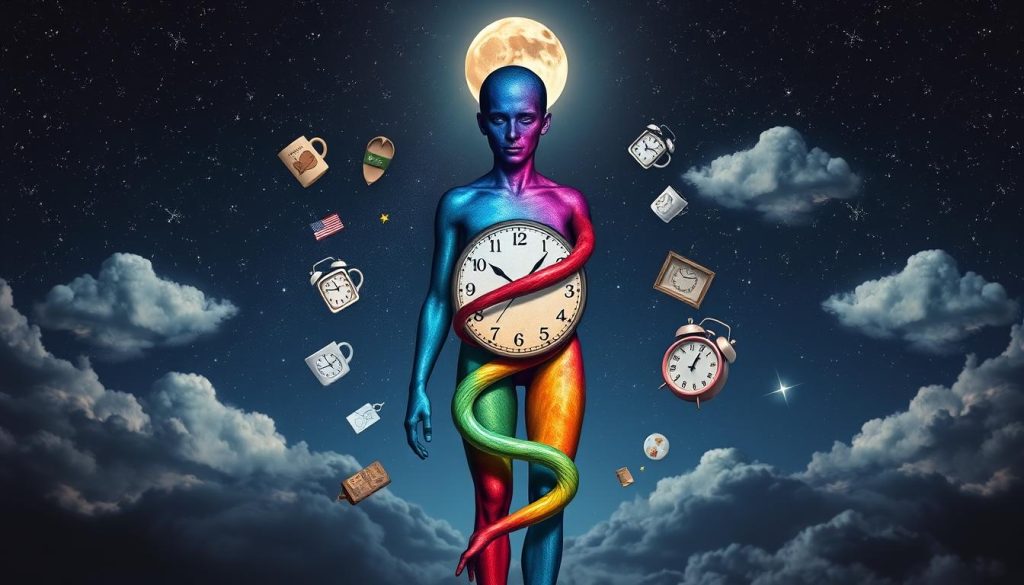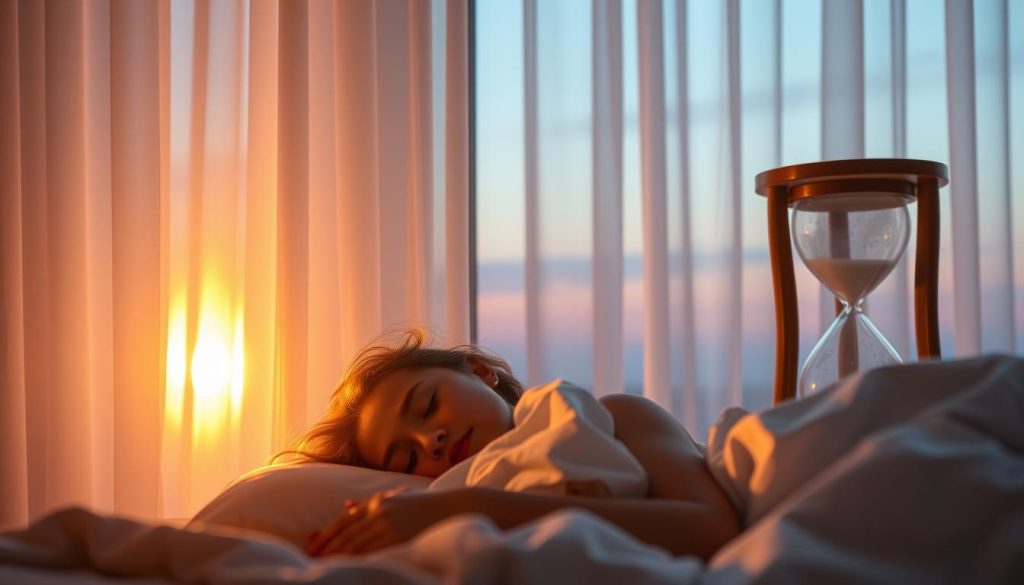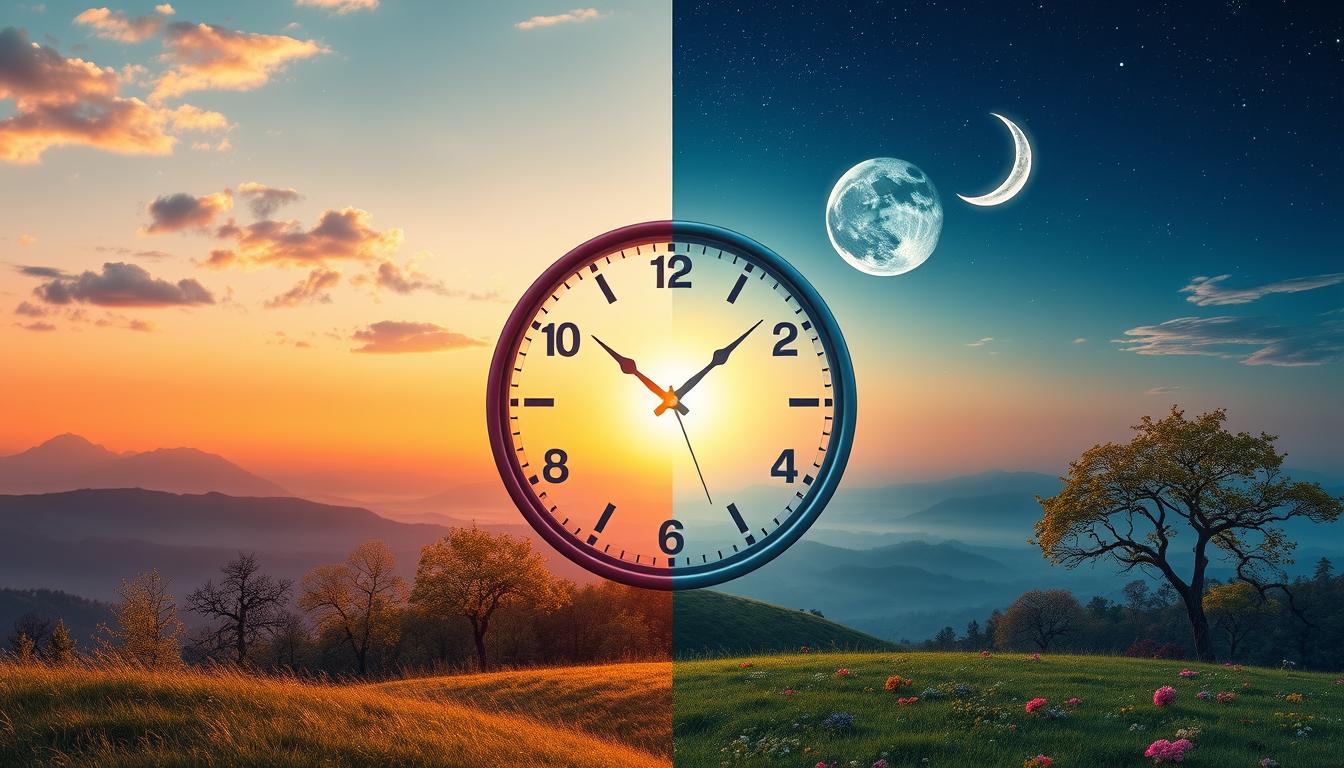Exploring the world of circadian rhythms, I find how they deeply affect my life. My circadian rhythm controls my sleep, energy, and health. It follows a 24-hour cycle, balancing sleep and wakefulness.
The National Sleep Foundation says knowing my circadian rhythm is key. It affects hormone release, digestion, and body temperature. Natural light helps me sleep better, improving my life and energy.
What is Circadian Rhythm?
The circadian rhythm is like an internal clock that controls our body’s functions. It tells us when to be awake, tired, or hungry. It works on a 24-hour cycle, influenced by light and other conditions.
Studies from the American Academy of Sleep Medicine show its role in our daily lives. It’s key to our well-being.
This rhythm does more than just control sleep. It also affects our brain, mood, and metabolism. Problems with it can cause sleep disorders, mood swings, and metabolic issues.
Learning about circadian rhythms helps us improve our daily routines. This can boost our physical and mental health.

| Aspect | Description |
|---|---|
| Definition of Circadian Rhythm | An internal biological clock regulating sleep, wakefulness, and other physiological processes over a 24-hour cycle. |
| Human Biological Clock | Guides various bodily functions, responding to environmental cues like light and darkness. |
| Importance of Circadian Rhythm | Essential for maintaining sleep quality and overall health, influencing mental and emotional well-being. |
How Circadian Rhythm Affects Sleep Quality
The link between my circadian rhythm and sleep is strong. Knowing this helps me spot and fix sleep problems linked to my rhythm. By understanding these issues, I can improve my sleep.
Common Sleep Issues Linked to Circadian Rhythm
Many sleep problems come from rhythm disruptions. These include:
- Insomnia: Trouble falling or staying asleep, often due to irregular schedules.
- Sleep Apnea: Sleep interruptions that worsen with irregular sleep.
- Jet Lag: Sleep problems from traveling quickly across time zones.
- Shift Work Sleep Disorder: Poor sleep from working odd hours.
Using electronic devices also hurts my sleep. The blue light from screens messes with my natural sleep cycle. This makes it hard to fall asleep when I want to.
Tips to Improve Sleep Based on My Circadian Rhythm
To better sleep and match my rhythm, I use these tips:
- Establish a Consistent Bedtime: Sleeping and waking at the same time every day helps my internal clock.
- Limit Blue Light Exposure: Cutting down on screen time before bed improves my sleep.
- Utilize Light Therapy: Natural light in the day and less artificial light at night helps my sleep cycles.
- Create a Relaxing Pre-Sleep Routine: Reading or meditating before bed tells my body it’s time to relax.

The Science Behind Circadian Rhythm
Learning about circadian rhythm reveals a lot about how our bodies work. Biological clocks control our circadian rhythm. They are in every cell, managing things like gene expression and metabolism. This ensures we work well.
A key part is the suprachiasmatic nucleus in our brain. It’s like the master clock, syncing our body with the outside world.
Biological Clocks and Their Functions
Biological clocks are key to our body’s functions. They follow a 24-hour cycle, mainly influenced by light. Light helps our clocks stay in sync with the world around us.
These clocks control hormone release, body temperature, and when we sleep. They help keep us healthy and happy.
Influencing Factors of Circadian Rhythm
While our clocks set our rhythm, outside factors can change it. Shift work, lifestyle, and seasons can mess with our natural rhythm. Cultural habits also affect when we sleep, eat, and do things.
Knowing how these factors work helps us adjust to our changing rhythms.

Recognizing Your Own Circadian Patterns
Understanding my unique circadian patterns is key to optimizing my day. By knowing when I’m most alert, I can plan my day better. It’s amazing how knowing these patterns can boost my work and happiness.
Identifying My Peak Performance Times
To find my peak performance times, I watch my energy levels all day. I notice when I’m most focused and creative. By keeping a journal, I learn when I’m at my best.
This knowledge lets me tackle tough tasks when I’m most ready. It helps me work better.
Tools for Tracking My Circadian Rhythm
Tracking tools help me understand my circadian patterns. Wearable sleep trackers from Fitbit or Apple show my sleep quality. Keeping a sleep diary is also helpful.
These tools let me see my sleep and energy levels. I can then make changes to improve my day. This way, I can control my productivity and happiness.

